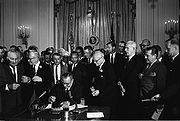Civil rights act de 1964
- Civil rights act de 1964
-
Civil Rights Act de 1964
Aux États-Unis le Civil Rights Act (plusieurs lois américaines portent ce nom) du 2 juillet 1964, signé par le président des États-Unis, Lyndon Baines Johnson, a déclaré illégale la discrimination reposant sur la race, la couleur, la religion, le sexe, ou l’origine nationale.
Il était conçu au départ pour protéger les droits des Afro-américains, puis fut amendé pour élargir la protection à tous, hommes et femmes. Cette loi contribua à réformer la société américaine dans la mesure où elle interdisait la discrimination dans les bâtiments publics, dans l’administration et les emplois.
Les lois Jim Crow des États du Sud furent abolies et la ségrégation raciale fut abolie dans les écoles et ailleurs. Si au départ les mesures d’application laissaient à désirer elles sont devenues par la suite plus efficaces et ont permis le développement de la politique d’« affirmative action » (traduite en français par le terme de « discrimination positive »).
Voir aussi
Liens internes
 Portail du droit
Portail du droit Portail des États-Unis
Portail des États-Unis
Catégories : Loi fédérale aux États-Unis concernant les droits civiques | 1964 | Lyndon B. Johnson
Wikimedia Foundation.
2010.
Contenu soumis à la licence CC-BY-SA. Source : Article Civil rights act de 1964 de Wikipédia en français (auteurs)
Regardez d'autres dictionnaires:
Civil Rights Act of 1964 — Full title An act to enforce the constitutional right to vote, to confer jurisdiction upon the district courts of the United States of America to provide relief against discrimination in public accommodations, to authorize the Attorney General to … Wikipedia
Civil Rights Act De 1964 — Lyndon Baines Johnson signant le Civil Rights Act le 2 juillet 1964. Martin Luther King se trouve derrière lui. Aux États Unis le Civil Rights Act (plusieurs lois américaines portent ce nom) du 2 juillet 19 … Wikipédia en Français
Civil Rights Act of 1964 — A federal law that prohibits discrimination on the basis of race, color, national origin, sex (including pregnancy), and religion in employment, education, and access to public facilities and public accommodations, such as restaurants and hotels … Law dictionary
Civil Rights Act of 1964 — Civil Rights Act of 1964, the a US law which says that businesses must treat people equally whatever their colour or religion, and that they cannot refuse to employ someone because of their colour. This law also says that restaurants and hotels… … Dictionary of contemporary English
Civil Rights Act von 1964 — Veröffentlichung des Civil Rights Act von 1964 durch das Weiße Haus … Deutsch Wikipedia
Civil Rights Act de 1964 — Lyndon Baines Johnson signant le Civil Rights Act le 2 juillet 1964. Martin Luther King se trouve derrière lui. Aux États Unis le Civil Rights Act (plusieurs lois américaines portent ce nom) du 2 juillet 1964, signé par le président des Éta … Wikipédia en Français
Civil Rights Act of 1964 — the US law that forced the southern states to allow African Americans to enter restaurants, hotels, etc. which had been reserved for white people only, and to end the practice of having separate areas for black and white people in theatres, train … Universalium
(the) Civil Rights Act of 1964 — the Civil Rights Act of 1964 [the Civil Rights Act of 1964] the US law that forced the southern states to allow ↑African Americans to enter restaurants, hotels, etc. which had been reserved for white people only, and to end the practice of having … Useful english dictionary
Title VII of the Civil Rights Act of 1964 — (Title VII) USA A federal law prohibiting employment discrimination against employees and applicants based on race, color, religion, sex or national origin (29 U.S.C. § 2000e). Title VII specifically prohibits discrimination in the terms and… … Law dictionary
Civil Rights Act of 1991 — Full title Civil Rights Act of 1991 Enacted by the 102nd United States Congress Citations Public Law Pub. L. 102 166 … Wikipedia
 Lyndon Baines Johnson signant le Civil Rights Act le 2 juillet 1964. Martin Luther King se trouve derrière lui.
Lyndon Baines Johnson signant le Civil Rights Act le 2 juillet 1964. Martin Luther King se trouve derrière lui.
